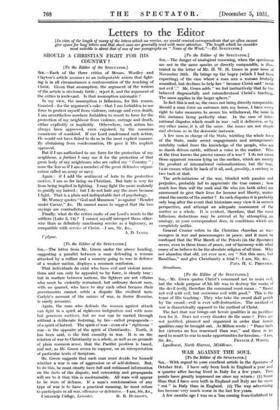[To the Editor of the SPECTATOR.] Sur,—The letter from Mr.
Green under the above heading, suggesting a parallel between a man defending a woman attacked by a ruffian and a country going to war in defence of a weaker nation, displays a common confusion.
That individuals do exist who have evil and violent inten- tions and can only be appealed to by force, is clearly true ; but in warfare between nations, the fighters are not villains who must be violently restrained, but ordinary decent men, with no quarrel, who have to slay each other because their governments cannot settle a dispute like civilized men. Carlyle's account of the nature of war, in Sartor Resartus, is surely accurate.
Again, the man who defends the woman against attack can fight in a spirit of righteous indignation and with none but generous motives, but no war can be carried through without a deliberate fostering, by lies—called propaganda— of a spirit of hatred. The spirit of war—even of a " righteous " war—is the opposite of the spirit of Christianity. Truth, it has been said, is the first casualty in war. It is on the relation of war to Christianity as a whole, as well as on grounds of plain common sense, that the Pacifist position is based, and not, as Mr. Green seems to suppose, on an interpretation of particular t.exts. of. Scripture.
Mr. Green suggests that each man must decide, for himself whether a war is one of aggression or- of self-defence. But, to do this, he must clearly have full and unbiassed information on the facts of the dispute, and censorship and propaganda will see to it that this is unobtainable. All wars will appear to be wars of defence. If a man's condemnation of any type of war is to have a practical meaning, he must refuse to participate in all war, offensive or defensive.—I am, Sir, &c.,










































 Previous page
Previous page